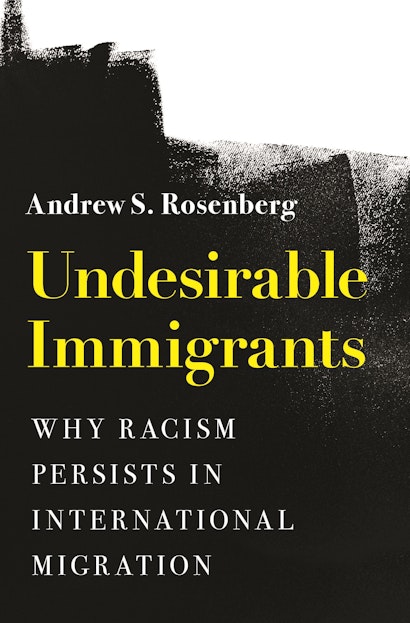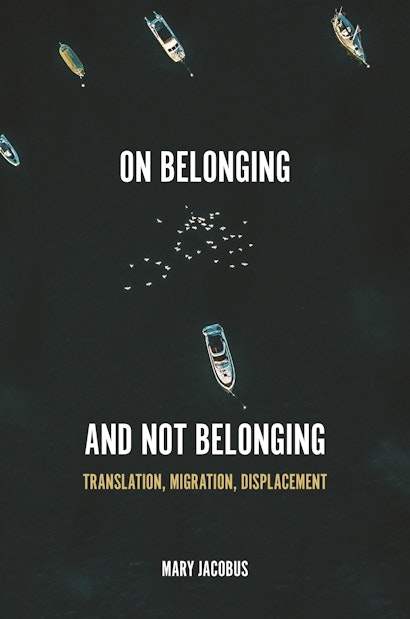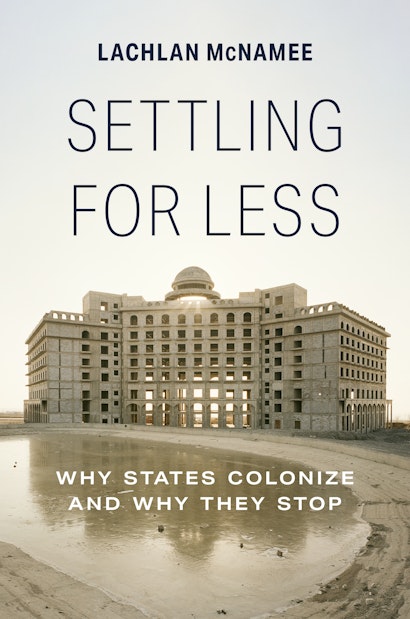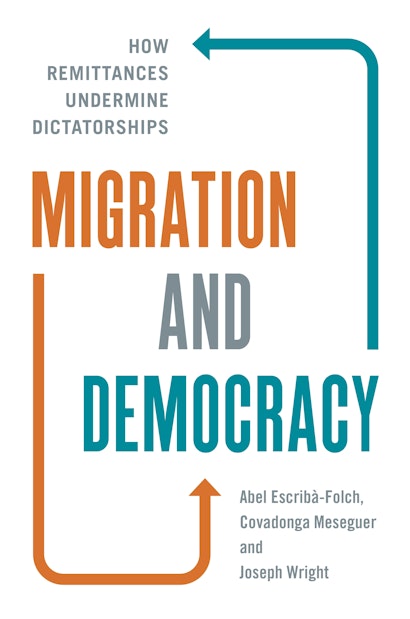Few phenomena sway global politics today as does migration. Economic volatility, violence-laden crises, and climate change produce millions of migrants annually and collectively threaten to displace much of the world’s population in the coming century. All the while, a staggering variety of causes and effects, coupled with a paucity of informed discourse in popular rhetoric and media, have generated an immense swirl of disinformation about migrants, fueling bigotry and xenophobia worldwide at profound human costs.
At av������, we remain committed to engaging with the intricacies of the global phenomena that shape our lives. In honor of International Migrants Day, we brought together four of our author teams to shed light on the lesser-known dimensions of their research by answering the following question: what perspective is missing from the contemporary discourse surrounding global migration? Their answers reveal unique, nuanced insights that illuminate the complexity of migration.
The perspective of history
Andrew Samuel Rosenberg (Undesirable Immigrants, 2022)
International migration may be the most contentious political issue in the world. Many citizens of Western countries vehemently oppose immigration despite supporting other aspects of globalization like free trade. Debates over migration have swung elections, the Brexit referendum, and have led to both international cooperation and discordance. And such debates persist in the global South too. Many of these policy debates revolve around whether a country should let in more migrants, and participants in these discussions focus on whether immigrants will bring economic calamity, social disunion, and security threats. Unsurprisingly, debates over immigration’s effects on wage rates have raged since at least the 19th century, and scholars have spent considerable effort investigating this relationship.
Imperialism’s effects not only led to negative economic, political, and social consequences in former colonized spaces, but they also created the perceptions among many in the West that the global South is a poor, dangerous, and unstable place.
However, there is an important piece missing from these debates: the role of history. My research considers how the history of imperialism affects the current politics of international migration. In other words, I don’t just study the current policies that states enact or the details of specific policy proposals. I explore the historical reasons behind why states want to restrict migrants. Specifically, my work reveals the role that Western states had in creating the immigrants that they now want to restrict. Western states exploited the non-White world through the slave trade, colonialism, and other methods of neo-imperialism. This exploitation produced the effects—violence and political instability, for example—that the West now cites as grounds to restrict migrants from those countries.
Importantly, imperialism affected both reality and perceptions of reality. It doesn’t matter if a given country wasn’t colonized, like Ethiopia. Imperialism’s effects not only led to negative economic, political, and social consequences in former colonized spaces, but they also created the perceptions among many in the West that the global South is a poor, dangerous, and unstable place. These perceptions spill over into migration policy-making and lead states to treat non-white migrants from these regions with added skepticism.
So when a politician argues that their country must restrict immigration because immigrants might threaten national security, it’s important to keep two things in mind. First, people from certain countries aren’t inherently more violent or more dangerous than anyone else. Different countries simply have had different historical experiences which generate cross-country differences in overall political violence. Second, it’s important to consider the role that one’s country played in creating the perceptions or reality that politicians use to justify their restrictive aims. It is easy for citizens of Western countries to argue that restrictive immigration policies are necessary to protect national security. But doing so ignores Western states’ historical responsibility for creating the supposedly dangerous threats that immigrants supposedly might bring.
The ongoing climate crisis emphasizes the salience of these points. Increasingly frequent extreme weather events will exacerbate climate migration, and citizens of the global South bear the brunt of these effects. As a result, the majority of the world’s climate refugee flows will come from the regions of the world that the West deems undesirable or dangerous. My research paints a pessimistic gloss on this near-future, and politicians and citizens will do well to consider the role that history plays in promoting anti-immigrant policies. Doing so could help alleviate a growing humanitarian crisis.
The perspective of the Other
Mary Jacobus (On Belonging and Not Belonging, 2022)
Viewing an exhibition at the National Gallery in Washington DC, , I stumbled on a work called “” (1988), by a Black Southern artist, Thornton Dial (1928-2016). Dial’s three-dimensional work seems at once timeless and strikingly contemporary. Made from everyday materials—found wood, plastic tubing, window screen, wire, epoxy putty, aluminum foil, enamel on wood—it hailed me, as works sometimes do. But why? Dial’s materials seem part of his subject. Instead of today’s rubber dingy, a raft that looks as if it’s made from the debris of a shipwreck that’s already happened. His refugees, their anguished heads pink, yellow, and brown, crowd the raft atop a collection of stick-figures. The steering-poles encroach on the exhibition wall. The three-dimensional work gets into the viewer’s space and mind. Its improvisatory yet syncopated movement captures something we don’t often register—not so much the dilemma that migrants pose for those who do or don’t want to admit them, but the mingled desperation and hope driving their attempted sea-crossing.
Dial’s refugees could be from any country, any time. Inevitably, they recall the overcrowded inflatables and fishing boats that feature in recent photographs of Mediterranean migrant crossings from North Africa and Turkey to Europe, and more recently across the English Channel. Given the date of Dial’s work, 1988, the best-known images during the 1980s would have been photographs of Vietnamese boatpeople, fleeing the fall of South Vietnam after 1975. The National Gallery’s caption chooses to invoke the Middle Passage. Unlike Dial’s ancestors, his refugees are making the Atlantic crossing on their own, undertaking a voyage that seems at once desperate, courageous, and foolhardy. These are not enslaved people. Instead, they have set themselves adrift in hopes of rescue, survival, and arrival. All they have is each other and their fragile raft. We’ve become accustomed (even hardened) to images of migrants trekking from Latin America to the Mexican Border or crossing Europe on foot with their children and backpacks. But migrants don’t often set out across the Atlantic on a raft.
The element missing from contemporary discourse around global migration is what refugees might look and feel like to those who are already casualties of migratory history.
Why is this work such an arresting metaphor and so evocative of all the dangerous crossings that have ever been made by refugees hoping to reach safety anywhere—but most of all the United States? Is Dial making an ironic comment on misplaced hope? Refugees trying to get to the United States (if they survive the dangers and rigors of the journey) confront problems on arrival—entry refused, asylum requests turned down, deportation. Or is Dial’s work a testimony to the desperation that will continue to drive global migration so long as humans have something to flee from and something to strive towards: freedom, wellbeing, work, life itself. We don’t often calibrate the scale of the hope that is the other face of the migrant’s flight from violence, poverty, famine, war, or climate change. The US is supposed to be a beacon of freedom, beckoning across the sea, promising a haven to refugees and asylum-seekers. But given the history of racial violence and fear within the US itself, the fact that Dial is a Black Southern artist makes this work harder to read.
The element missing from contemporary discourse around global migration is what refugees might look and feel like to those who are already casualties of migratory history—scarred by injustice, forced displacement, or resettlement, whether as slaves or spoils of war, or as part of population exchanges and political carve-ups (the relocation of Greeks from Asia Minor after WWI, the Partition of India after WWII). Dial’s three-dimensional work can be read as a compelling form of visual testimony, as a memorial to loss and disaster, or even as a celebration of survival against the odds. But for those who get there, by whatever means, this is not the end of the story. Dial’s work offers a glimpse of what a discourse of global migration might look like from the other side, from the side of the Other.
The perspective of internal migrants
Lachlan McNamee (Settling for Less, 2023)
It is a common refrain that we live in a world of migration. What we often forget, however, is that the vast majority of migration occurs within, not across, international borders. One in every seven people in the planet is an internal migrant today. But because internal migration is rarely a hot-button political issue in the West, it often escapes attention. The movements of refugees, not those of fellow citizens, grab the headlines.
Internal migration, when it coercively displaces indigenous peoples from their lands, can be a form of settler colonialism.
This is a shame because internal migration can, under certain circumstances, also be extremely controversial. Consider the case of Israel. Israel has secured control over contested areas that it claims in the West Bank by displacing Palestinians and offering their land to Israeli citizens. Israel’s use of migration as a tool of state-building is actually a pretty common phenomenon, though. For instance, over the 20th century, Indonesia resettled 5 million people from its core islands, like Bali and Java, to outer islands, like West Papua. Much like the Palestinians in the West Bank, indigenous peoples in Indonesian West Papua have been displaced en masse by a state and transformed into a minority in their own homeland. The same is true for China in Xinjiang, Morocco in the Western Sahara, Bangladesh in the Chittagong Hills, Iraq in Kurdistan, India in Kashmir, and so on. In all these places, states have opened up free land and housing in contested frontiers in order to flood them with dominant ethnic groups.
Internal migration, when it coercively displaces indigenous peoples from their lands, can therefore be a form of settler colonialism. It is odd, then, that Israel’s settler colonial policies are the only ones to have received international condemnation or substantial scholarly attention. Indeed, and with breathtaking hypocrisy, Israel has been repeatedly criticized by states, like Indonesia, Morocco, and China, that have also repeatedly displaced minority groups and settled contested lands. Why is that?
In large part, our inattention to contemporary settler colonial projects in the Global South stems from the fact that we misunderstand the role that racial ideologies play in settler colonialism. We often think of settlers as white and of settler colonialism as motivated by the desire of states to remove unwanted populations from their jurisdiction>—as for Israel in Palestine. But flooding a contested area with a dominant ethnic group can also, perversely, be rhetorically justified by racial equality. When all ethnic groups have the same political rights, after all, no one ethnic group has any greater claim to a piece of territory than any other group. There is then no normative or legal basis on which to prevent fellow citizens from settling in minority-dominated areas.
For instance, to justify the presence of millions of Han Chinese settlers in restive frontiers like Tibet or Xinjiang, China’s President Xi Jinping recently emphasized how “Ethnic equality is the prerequisite and basis for achieving national unity … the Han cannot be separated from the ethnic minorities, and the ethnic minorities cannot be separated from the Han.” Indonesia’s former Minister for Transmigration similarly emphasized how settling Javanese and Balinese people in frontier areas like West Papua would “realize what has been pledged: to integrate all the ethnic groups into one nation, the Indonesian nation.”
These rhetorical justifications are, of course, red herrings. My work clearly shows how states like China and Indonesia manipulated internal migration, not for benign goals but to defeat separatist movements and win control over valuable natural resources. Ethnic equality was simply a useful rationalization for denying indigenous peoples self-determination and for flooding their lands with co-nationals. Yet, precisely because settler colonialism can be justified on ostensibly “anti-racist” or pro-national grounds, these states have escaped global condemnation.
We should disregard self-interested official rhetoric and think harder about when and why all states—not just Israel—turn internal migration into settler colonialism. Dispossessed and colonized minorities across the Global South today, like the Tibetans and West Papuans, deserve nothing less.
The perspective of ramifications in the Global South
Abel Escribà-Folch, Joseph Wright, and Covadonga Meseguer (Migration and Democracy, 2022)
While human migration has been debated and studied for decades, most of what we know about the flow of people across borders focuses on immigration and the economic and political consequences of immigration in recipient countries throughout the Global North. However, debates about immigration rarely feature reflection on the increasingly large flow of South–South migration, and few discussions of immigration, particularly those focused on border control policies or immigrant rights, explore how emigration shapes political and economic outcomes in the countries migrants leave.
In our research, we highlight an important economic consequence of emigration, namely workers’ remittances. These financial flows, we argue, have the potential to foster profound political changes in the Global South. Thus, understanding how remittances boost democracy in the Global South should inform contemporary discussions about the regulation of migration.
The volume, stability, and private character of remittance flows make them unique, with the potential to provoke important socio-political changes in receiving countries.
Remittances constitute the largest source of foreign revenue in many developing countries. They are a crucial lifeline for millions of families around the world. These remittance flows are not only enormous in size, but also remarkably stable, in fact increasing in times of economic difficulties. Moreover, unlike other international financial linkages, such as trade revenue, international aid or foreign investment, remittances are received by families directly because this income flows between private individuals—not governments or firms aligned with ruling parties. The volume, stability, and private character of remittance flows make them unique, with the potential to provoke important socio-political changes in receiving countries. Our research demonstrates that remittances destabilise autocratic regimes and can therefore drive democratization in the Global South.
How does this occur? During the past three decades of globalization, autocracies have been most likely to fall because their leaders are either voted out in elections or citizens oust their rulers during a mass protest campaign. Our research shows that workers’ remittances shake two pillars upon which autocratic stability relies: government repression and ruling parties buying voters’ support. We found that additional income from remittances abroad makes citizens more independent of their rulers’ attempts to buy their electoral support. By raising incomes and reducing households’ dependence on these regimes’ gifts and favours, recipients choose to remain at home on election day or vote for the opposition instead. This facilitates long-ruling parties’ electoral defeat.
Second, across the globe, anti-regime protests have toppled dozens of dictators in the past three decades. And diaspora populations have been instrumental in mobilizing these protests – both helping coordinate them from abroad and contributing resources to the opposition with financial remittances. By allowing remittance recipients to buy the time and the means to protest, financial remittances enable opposition mobilization against authoritarian rule, often precipitating regime change.
These remittance-driven mechanisms—decreasing electoral support for ruling parties and mobilizing opposition protests—helped weaken dictators’ grip on power in countries as diverse as Cambodia, the Gambia, and Mexico. Thus, the remittance income reshapes the balance of power in dictatorships, often leading to democratic regime change.
Amid moves to decelerate globalization in the aftermath of the global pandemic, emigration and workers’ remittances play a crucial role in sustaining household incomes and mitigating financial risks in the Global South. Remittance flows recovered quickly from the Covid-induced decline and have now reached record levels. While autocratic governments may attempt to appropriate these flows and often claim ownership of the prosperity brought about by emigrants’ remittances, emigrants and their relatives who still live in their home countries will continue to drive political change in their countries of origin thanks to the financial autonomy granted by remittances. If the Global North is serious about promoting economic development and democracy in the Global South, the North will have to engage in policies that promote these flows. A more generous approach to facilitating the orderly settlement of migrants could make a potent contribution to this goal.
This exchange was facilitated by Akhil Jonnalagadda as part of the av������ Publishing Fellowship program.




